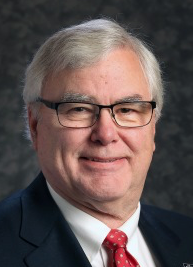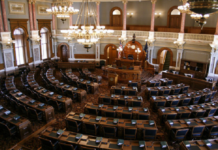(Updated to correct that bill requires students to pass test, not course)
A bill that would require Kansas students to pass an American civics test to graduate from high school cleared a House committee Wednesday but with tepid support.
The House Education Committee sent the bill to the full chamber without a recommendation, making it harder to eventually pass.
The bill faced stiff opposition in committee, which ultimately agreed to send the legislation to the full chamber but only without a recommendation.
Critics questioned the $400,000 cost of the bill and about who would develop the test, which is supposed to reflect one administered by the federal government for new citizens coming to the United States.
“I still have a lot of questions,” said Democratic state Rep. Jerry Stogsdill of Prairie Village.

“I still do not understand what the $400,000 is being spent on. I don’t understand how much teacher time this is going to take,” Stogsdill said.
“I don’t understand how the test is going to be developed and we can be assured it’s standardized for all students in the state,” he said.
“To just shoot this out of committee before we’ve had those kinds of questions answered is just irresponsible,” he said.
Rep. Steve Huebert, chair of the Education Committee, said he wanted to find compromise, but said he wished those issues had been fleshed out during the committee hearing.
He said he hopes by moving the bill along he can reach an agreement with the Kansas State Board of Education that’s suitable.
Members of the state Board of Education have already said the bill encroaches on the board’s constitutional responsibilities to generally supervise the school system.
Huebert is not ready to give up after going before the Board of Education on Wednesday.
“I believe this is something that is important to move forward,” Huebert said.
“Based on my previous experiences, this is a good way to keep things moving by still reaching out to the board to get to a solution that we can all have a unanimous vote on.”
Huebert said he didn’t believe the estimated cost of the bill. The cost was based on 40,000 students taking the test each year at $10 a test.
“I believe that is something that is not accurate,” he said. “I hope, even as we move forward, to get that clarified.”
Republican state Rep. Mark Schreiber of Emporia questioned why the bill needed to be moved through the process so quickly.
He said waiting and working out the details might help build support for the legislation.
“I am missing the urgency here about trying to get it out,” he said.
Huebert said he is trying to move the legislation along with the possibility that a COVID-19 outbreak could shut down the Legislature.
“I was told if this was a priority for me, that I needed to do it right out of the chute.”
Republican state Rep. Boyd Orr was among the lawmakers who would have voted against the bill without more answers.
He agreed, instead, to send the bill along without a recommendation.
Huebert said he felt the need to act because a compromise hasn’t been reached and there are no guarantees how long the session will last.
The bill does not provide a passing grade, leaving it up to the Board of Education to establish a passing score in rules and regulations.
Students could take the test as many times as necessary starting in the seventh grade to pass. It would start July 1 and cover any accredited public, private or parochial high school.
It drew opposition from the Kansas Assocation of School Boards and the Kansas National Education Association and two members of the Kansas Board of Education.















